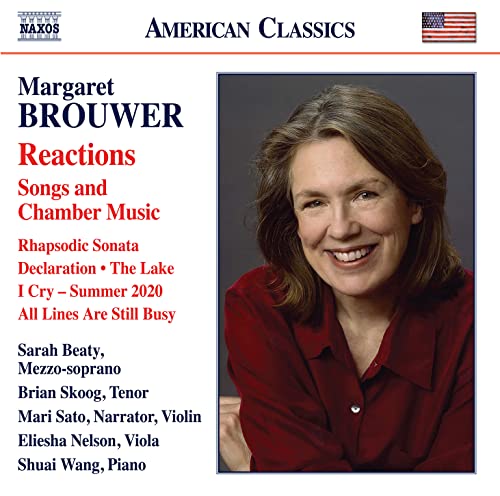by Nicolette Cheauré

Through a mix of instrumental and vocal chamber music featuring Sarah Beaty (mezzo-soprano), Brian Skoog (tenor), Mari Sato (violin and narration), Eliesha Nelson (viola), and Shuai Wang (piano), Brouwer offers a study of the range of human emotion.
Her opening piece for solo viola and piano, the Rhapsodic Sonata, is a tender ode to being in love that plays with a variety of harmonic landscapes and melodic conversations. Themes first presented by Wang in the piano’s underlying rhythm are later taken up and expanded upon by Nelson. The violist soars with virtuosic, high-register passages and brings out the depth and richness of her lower register during slower material. In the second movement, both parts burst at the seams with emotion.
The finale contains a host of extended techniques — glissandos, double stops, harmonics, a variety of bow strokes — and a collage of melodic subjects all melting together to drive forward towards the end of the piece. Brouwer’s way of wrapping up this set of three contrasting movements not only allows Nelson and Wang to show off their musical and technical prowess, but also lets the sonata live up to the rhapsodic character that the title suggests.
Declaration situates listeners directly into a story of sadness caused by violence. Based on poems by Ann Woodward and David Adams, and a quote from the Declaration of Independence, the four-movement structure contains songs that depict children running from danger, and widespread mourning. Beaty’s vocal timbre matches the mood throughout, showcasing the prayerful yet solemn nature of the texts and perfectly reflecting the way people cope with devastation.
The next two pieces on the album, I Cry (Summer 2020) and The Lake, present a pleading, meandering journey on which the musicians embark. I Cry features Sato in a desperate lament, examining the feelings of isolation and the restrictions placed on people throughout the COVID-19 lockdowns. Insistent solo lines that flow between the lowest and highest points on the violin allow for an expansive quality reminiscent of the weeping nature the title depicts.
The Lake describes a man walking near water before finding piles of dead fish and signs of pollution, ruining his tranquil experience. Skoog’s powerful tenor and Wang’s piano melodies work hand in hand with the text to create an effective tone poem. The piece closes with the haunting words “All gone…go back,” a poignant ending in the face of tragedy.
Concluding the album is the satirical All Lines Are Still Busy, mimicking what it’s like to be stuck on hold during a phone call. Musical phone rings, the growing frustrations at the unhelpful person on the other line, and the endless, looping hold music of Pachelbel’s Canon in D are all portrayed vividly by Sato in both music and narration. The piece contributes some levity to an otherwise somber album, one that provides insight into how the world has been wrangling with the last few years.
Published on ClevelandClassical.com June 22, 2022.
Click here for a printable copy of this article


